This post may contain affiliate links. Please read our disclosure policy.
This essay Lebanese Chicken Rice Pilaf, Hushweh, about was my first food-related publication, which happened to include a recipe for hushweh. It appeared in the Washington Post in 2004. The Association of Food Journalists awarded the essay first place in one of its competitions that year, and the essay won me the Greenbrier Scholarship to the Symposium for Professional Foodwrtiers. So among other things, hushweh brings good luck.
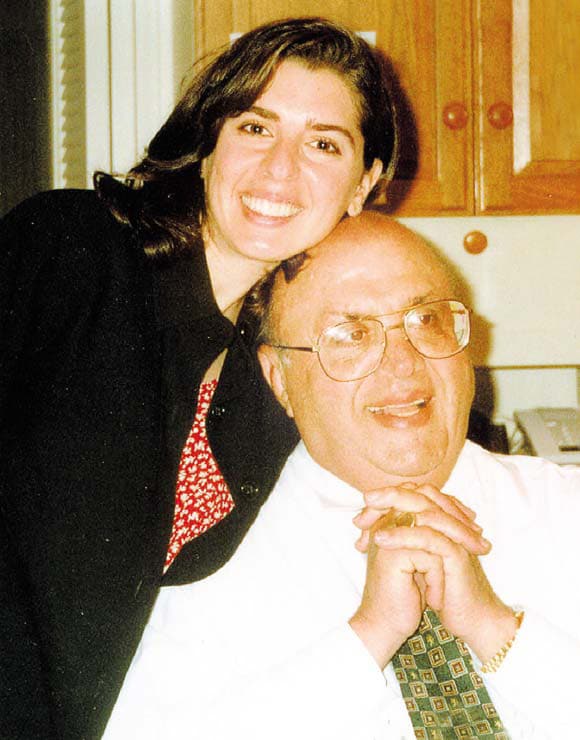
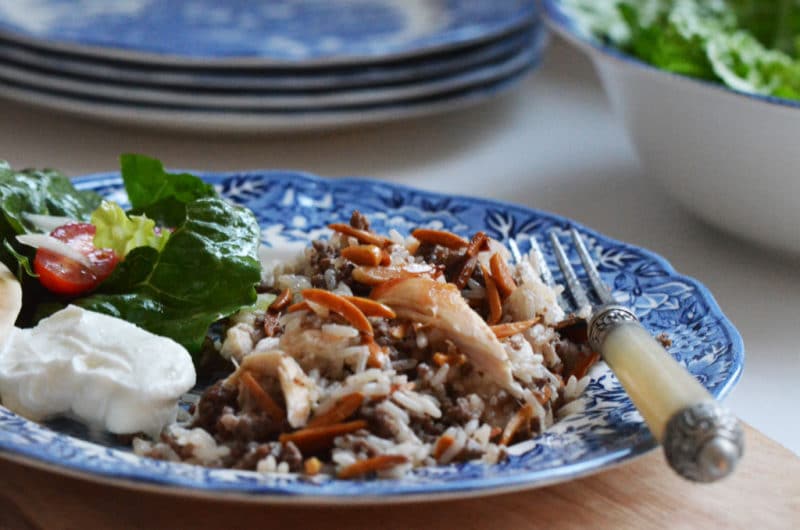
The Lebanese cook their grief. Illness and death call the Lebanese to their kitchens, to their lists on the fridge, to their huge pots and pans that they can lean on, sighing, stirring, spicing, clicking their tongues over the need to make this food now, so heartbreakingly rich and warm.
Other cultures have their responses. But for the Lebanese, the crosses pressed into platters of kibbe are a little deeper, the Arabic blessings over the hands of the cook more fervent. It’s our way of saying: We will not go without a proper send-off, without this day spent in the kitchen kneading the sadness into the dough, boiling the sorrow into the milk, and preparing a full stomach for the journey.
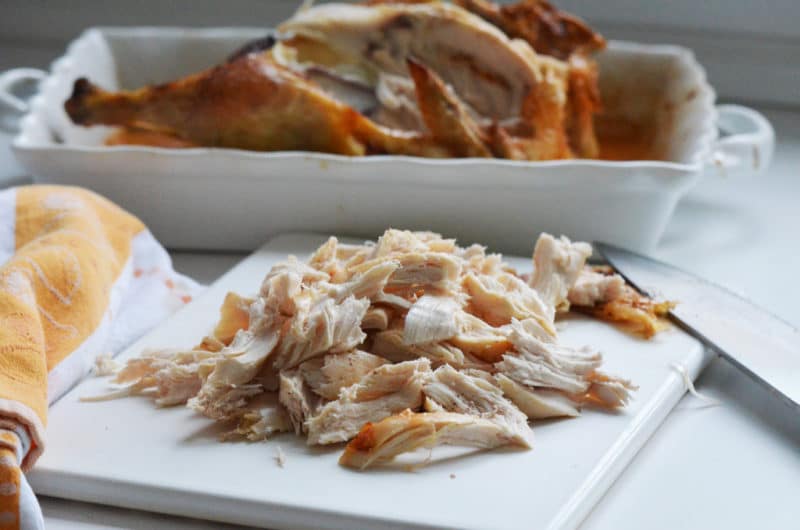
For weeks after my father was diagnosed with terminal illness, family, friends and neighbors crossed our threshold bearing gifts of food. Relatives whose exact connections I have never been sure of came to the house in a steady stream, whispering “hello, honey” with their Arabic accents, and giving a kiss on each cheek.
One day when I went out for the mail, I found a loaf of banana bread in the mailbox. Our cousin Suaad rang the doorbell one quiet early evening and marched in with Tupperware containers of cookies, red Jell-O with whipped cream and freshly baked fatayar. The scent of these golden brown little triangles of dough filled with meat transported me to Sitto, my grandmother gone many years by then. I could see her pushing rosary beads through her fingers like worry beads, and praying, dear God, this should never happen.
There was so much food that our neighbors—Italians who know how to handle large quantities of anything—rented a refrigerator for our garage. Every shelf bulged with containers. The showstopper in this procession was the largest ham I have ever seen. Uncle Fred baked the 28-pound hunk of meat in his own huge oven, slowly and with plenty of basting. For every major family event, from nuptials to burials, large cuts of meat are a typical Abood response. The bigger the emotion, the more enormous the cut of meat.
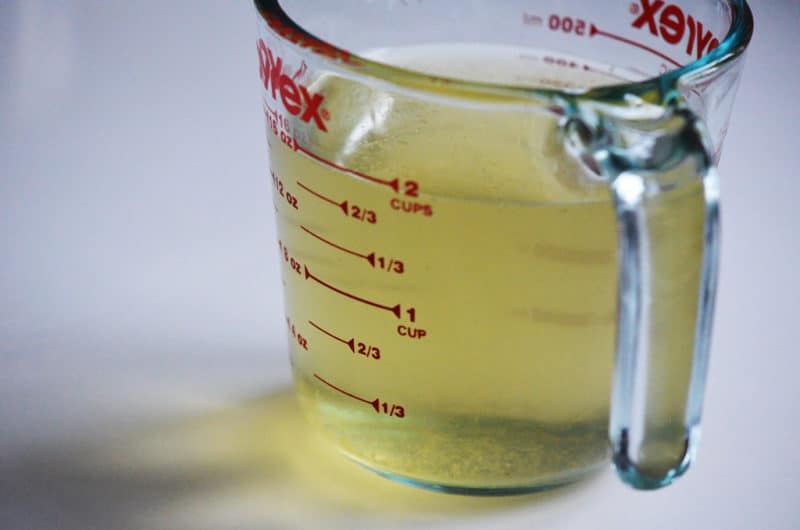
Uncle Fred struggled as he hoisted the ham, covered in aluminum foil, onto our kitchen table, with the look of accomplishment behind the tears running down his cheeks. My father’s illness and death had brought about a kind of reconciliation among his brothers, who for years had a fractious and mercurial relationship. They had inherited their mother’s passionate temperament, one that refused to be stifled in anger or in love. The brothers’ success in their family law firm was the happy backdrop to the drama of their disputes, ending in an explosive dissolution of their partnership.
In the weeks of his short illness, my father’s two living brothers could not stay away. They came to our house with an outpouring of love—and food. Faduluh, Uncle Fred said, as he walked in. “Come to the table.” He pulled back the foil, letting the savory scent fill the kitchen, and asked for a sharp knife. Slicing away the juicy pink pieces, he offered whoever stood or passed by a piece to sample, enumerating the steps one takes to perfect such a ham.
“You go to Goodrich’s,” he began, looking my sister Peggy right in the eye. “Goodrich will get you whatever cut of meat you want, and it will be the best. “Then you have to get one of these foil baking pans. This makes it easy to take to someone’s house. No pan to retrieve. Pour your pineapple juice over top,” he demonstrated this with an imaginary container of juice. “Every half-hour or so, you’ve got to baste it good with the juices. And, sweetheart, add some more when you see it getting low.”
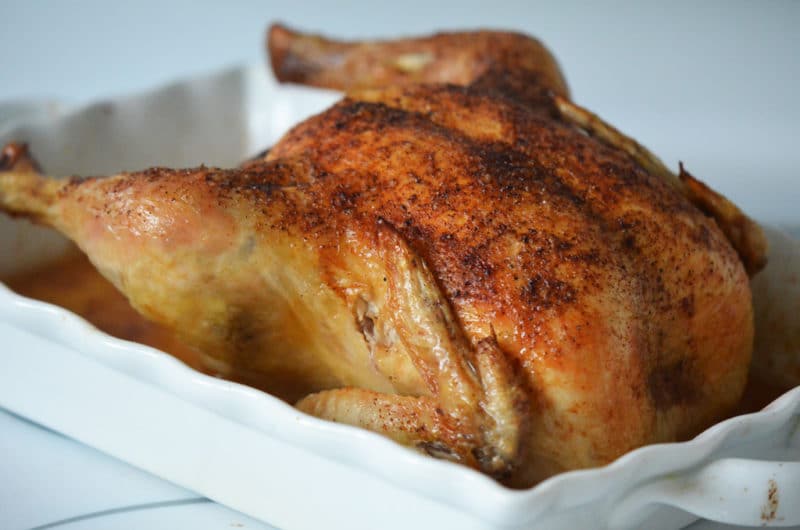
Uncle Dick, the youngest brother, came to my father’s bedside again and again and sat for hours. He brought groceries, including quantities of thick strip steaks from the butcher. My grandfather had been a butcher, and the Abood brothers knew and loved meat without apology. Their father taught them to grind the reddest, leanest lamb for raw kibbe, eaten in our family on all special occasions.
Before we grilled Uncle Dick’s steaks, he cut off a corner just as my father would have and ate it with a slice of onion. The raw meat was not unlike the brothers, and their sisters, too, in their approach to life: They must taste it raw, to be sure it’s genuinely good.
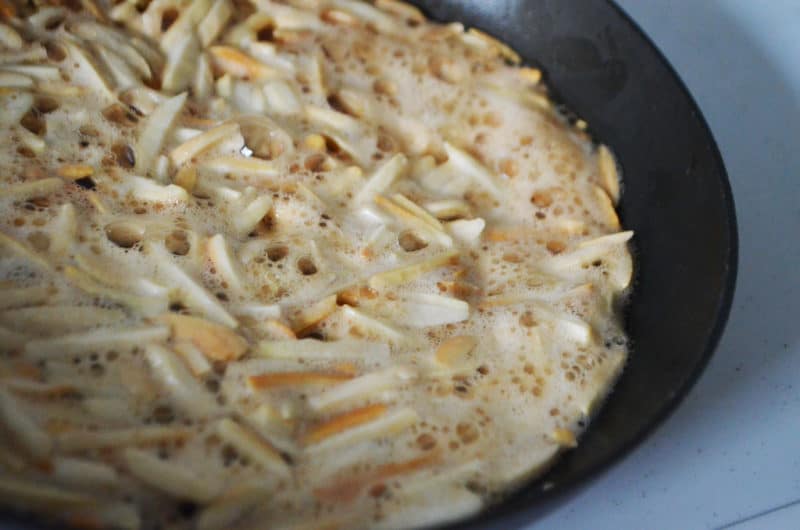
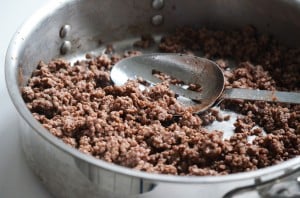
Father’s Day fell during the last week of my father’s life. He was fighting the weakness caused by cancer but still wanted to eat with the family at the table. He asked for Lebanese chicken and hushwe for his Father’s Day meal, a dish he knew would fill the house with the comforting scent of roasting chicken and the hushwe’s buttery mixture of rice, toasted pine nuts and ground beef. We sat together to eat—my three brothers, my sister and me. My father came in on my mother’s arm and sat at his place quietly, slowly. He looked over the table of steaming Sunday dinner and seemed to be recalling the history of meals placed before him just like this one.
That long, narrow cherry kitchen table and its chairs make up the one set of furniture in our house that never underwent a major facelift or replacement. The table has many leaves and stretches its thin muscles when we’re all at home together. The chairs are bentwood, their cream paint chipped in places to reveal my mother’s love of yellow years ago. You can fit eight easily around the table when it’s not in full leaf, and you don’t much notice the chairs. Their role is simply to hold up the family and the food.
Mom filled my father’s plate with small portions of everything. He listened to us all talking and never did raise his fork to his mouth. After a short time, he whispered, in a most somber manner, that he needed to lie down again. We shared his sorrow in leaving the table; he would not sit with us at the table again. Once he was settled on the couch, without speaking, we each took our plates into the family room and sat together, eating, around him there.

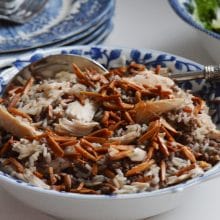
Lebanese Chicken Rice Pilaf, Hushweh
Ingredients
For the chicken:
- 3 to 4 pound chicken
- 1 medium onion, peeled and quartered
- Paprika
- Granulated Garlic Powder
- Kosher salt
- Black pepper
For the hushweh:
- 1 pound ground beef or lamb
- 1/2 tablespoon cinnamon
- Kosher salt and freshly ground black pepper
- 1 cup long grain white rice
- 6 tablespoons butter
- 2 cups low-sodium chicken broth
- 3/4 cup pine nuts or slivered almonds, toasted
Instructions
- Preheat the oven to 425 degrees.
- Pat the chicken dry. Place it in a large roasting pan with ½ cup of water surrounding the chicken. Stuff the onion in the cavity. Rub a couple of tablespoons of oil over the skin to coat and season lightly with paprika, garlic powder, salt and pepper.
- Roast the chicken until it the juices run clear when the chicken is pierced, and the meat reaches an internal temperature of 160 degrees on an instant-read thermometer, about 1 hour. Meanwhile, baste the chicken every 15 minutes.
- To toast the nuts, in a small skillet over medium heat, melt 1 tablespoon of butter. Add the nuts and cook, stirring constantly, until golden brown. Remove from the heat. Salt lightly. Try not to eat all of the nuts now—you’ve made them for the hushweh.
- While the chicken is roasting, make the hushweh: In a large dutch oven or sauté pan over medium heat, cook the ground beef, using a wooden spoon to crumble it, until no trace of pink remains.
- Season the beef with cinnamon, salt and pepper to taste and stir to combine. Add the rice and 2 tablespoons butter and cook, still over medium heat, stirring constantly, until the butter melts and the rice kernels are completely coated. Add the broth and bring to a boil. Reduce the heat to low, cover and simmer for 20 minutes. Do not stir while cooking.
- Transfer the chicken to a cutting board and set aside until cool enough to handle. Remove and discard the skin. Shred the chicken into bite-size pieces.
- Add the chicken, 1/2 cup of the toasted nuts, remaining 5 tablespoons butter (or more, if you prefer) and plenty of salt and pepper to the hot rice mixture and stir to combine. Sprinkle with the remaining nuts and serve immediately.
Nutrition information is automatically calculated, so should only be used as an approximation.
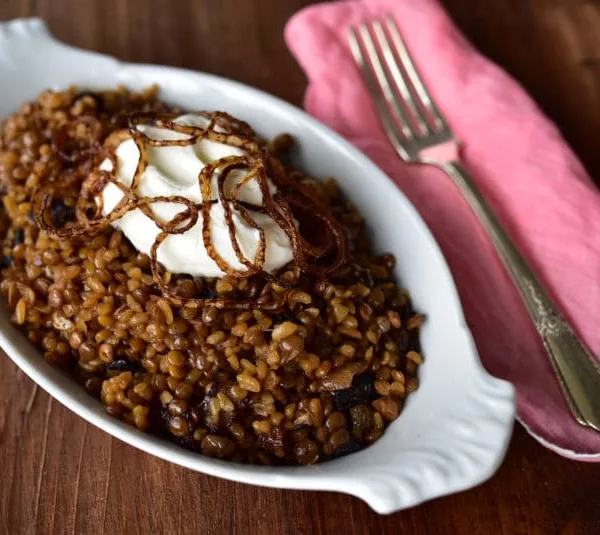
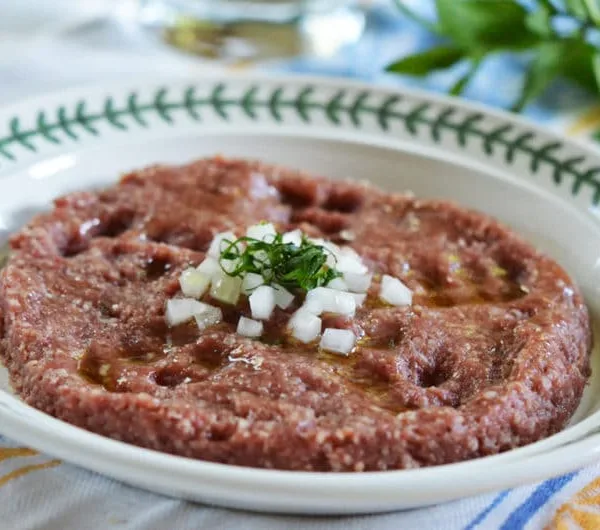
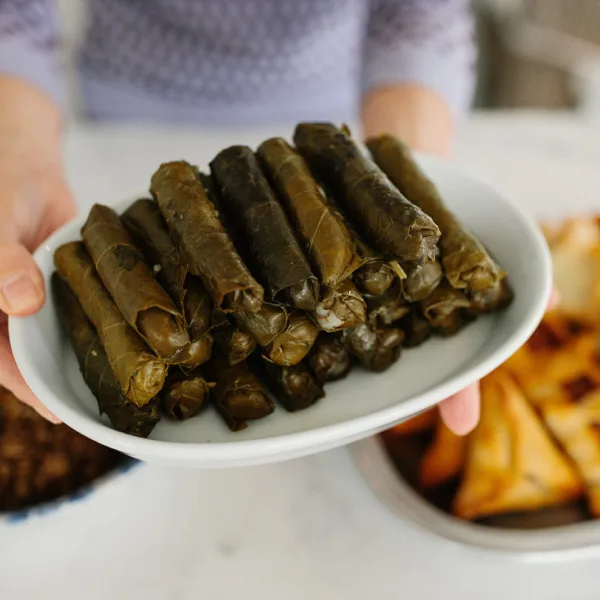
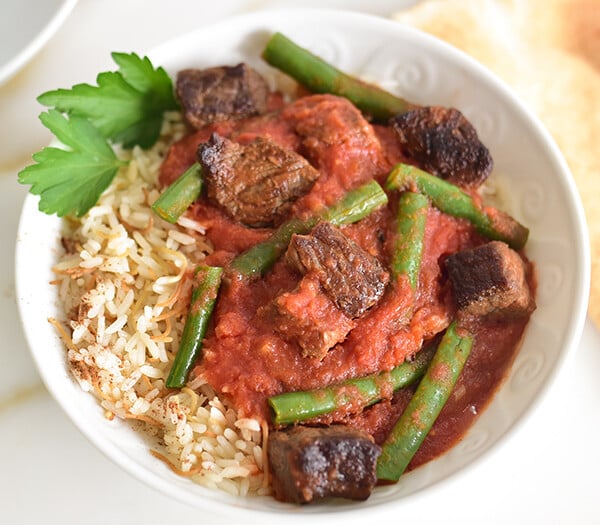







I made this last night for my husband and my daughter’s family. You would have thought it was a gourmet dinner based on how they ate! This was always served as a “mercy meal” in the church hall (Maronite) after a funeral. My daughter considers it comfort food. I guess it needs to be a more regular thing, my SIL said I was holding out on him since I had never made it before.
How nice Mary Anne…we do make hushweh often but also for mercy meals too! So comforting. My husband’s favorite meal.
Maureen,
Can I freeze my stuffed grape leaves? I’m traveling right up until Christmas and won’t have time to make them when I get home.
Hi Beth, you sure can. Roll them and freeze them in layers with wax paper between, or freeze them in the pan you’re going to cook them in, no problem.
My Lebanese family calls Hushweh, Oozie. It is a family favorite. It is what my father and grandma called it. My family came from Zahle.
I could so relate to the story of your father and sitting at the table. My dad also died of cancer, and your family story certainly brought back sweet memories of my dad sitting at the table. The table is where we gathered, and where stories and love has flowed in and to each member of our family. Bless you.
Thank you for sharing.
Nancy, I send a hug. That is a beautiful comment, thank you so very much. We are blessed to share a table full of blessings and love with our people.
I will make this recipe, I ‘m sure it will be delicious, but your loving words about your Father, your Uncles and your Mother and the love you all so tenderly shared has made me cry soft tears and that is the real gift.
Thank You,
Kelle
Thank you so very much Kelle. Truly special and thank you for sharing in the love.
All the recipes are incredible, so much good nutrition and flavor!So extraordinary to a New englander who grew up with more simple dinners.
Thanks so much!
Sally thank you so much, I’m thrilled you’re making and enjoying. Warm regards to you in beautiful New England!
I know so well the joys and sorrows that accompany a Lebanese family and your story brings back so many wonderful memories of my sitto and mother who have since departed.
Their memories live are forever baked into my heart and live on in their recipes which I share with my children. Every time I make na’eesh the smell of zaatar brings me back to sitto’s kitchen over 50 years ago.
The food and the memories, just so beautiful. Thank you John, it all means so much to all of us, doesn’t it. God bless the Sitto’s and mothers and all gone who we hold so close in our hearts.
Maureen – this is so beautifully written. I had the pleasure to meet your father a few times and what a lovely man he was. Wishing you and Dan a fantastic summer filled with great food and love.
Brian thank you so so much. I love knowing you and Dad met! Happy summer to you and Ken and all.
I will never get tired of hearing that story! God bless you Maureen for your beautiful words.
XO
We miss them don’t we?! Thank you cuzzy.
Hi Maureen,
First off I wanted to say hi and thank you for chronicling your recipes. This website is fantastic. I stumbled across it by accident, as I was googling one day for a recipe for hushwe. I too come from a Lebanese background. My grandparents (both sides) immigrated to Northern Ontario, Canada. We have a large family too. My father, Fred, is one of 8 siblings and my mom Helene, is one of 7. Both parents have passed away and I was lucky in that I managed to sit with my mom and document some of her recipes. When I found this site, I was amazed at how similar your recipes are to hers. When perusing your recipes and site, it brought back tons of memories, when I was a kid and the food we used to eat. I grew up on fatayer, kibbe (my favourite), hummus, mujudara, the beef and green been stew (we used to call it yukkani , my apologies for not knowing how to spell it), and a bunch of others. When I was older, I would help out, not only taste testing it to make sure it was the best she ever made, but cooking the aras kibbee, helping her bake the bread and learning how to make all of my favourites ( some how unconsciously preparing myself to try and keep making the food I absolutely love. My mom was a great cook, the greatest in my mind. Even on my dad’s side, my aunt where legendary in the kitchen. Family get togethers where sights to behold. I used to call the meals “gut busters” because if you didn’t need to lie down on the couch for a nap after eating, you clearly weren’t healthy and didn’t eat enough at the table :-). I was especially touched by this essay you wrote about your father. I too had an Uncle Dick, and everyone was an expert on one thing or the other and always let you know, if the subject came up, how to do it the right way. I remember the legendary discussion of whether or not you put cinnamon or allspice in kibbee. My mom and my grandmothers used cinnamon and my dad’s side used allspice. It was always good for a long discussion. Your recipe for hashwe is exactly how my mom made it and I noticed too that even your mom’s recipe for oven fried chicken was the same. Great cooks think alike I guess. Anyways, I could go on but again I just wanted to say hello, and thank you for your site, your recipes and for bringing back so many wonderful memories. I am sure my Mom, Dad and all my aunts and uncles are having one hell of a get together in Heaven.
Kindly,
Rob.
Rob, this is what it’s all about right here. I’m so happy to meet you here and to know your story, which is like so many of ours here. Special, happy memories of our foods and our special, special people, many of whom are gone and we miss dearly. We keep the traditions alive to stay connected to them, the memories, and to share again this incredible food. Thank you for taking the time to share and say hello!
Such a lovely and honest remembrance Maureen. I will never ever forget kneading the dough for holy bread when my Siti died. She said I shouldn’t dare let “them” use bakery bread while she showed me how.
Beautiful Carol, thanks so much.
Maureen, I was searching for a “hashwi” recipe that I’d misplaced (it resembled the dish from Woody’s Oasis, but I left EL long ago) and came across this post. It is entirely possible that I may have been the cantor/soloist for your father’s funeral mass, and if so, then I am stunned and amazed at the randomness of life! Even if not, this is a beautiful memory you’ve told, and thank you for sharing the recipe!
Well I’m just blown away by this Melody!!! The music at Dad’s funeral was very important and special to all of us and comforted us in so many ways. Thank you for taking time to write . . . I just read your comment to my mother, who is also so very touched. Enjoy your hushwi, our favorite!
Maureen what a beautiful story. When any of our family members passed and even friends my aunt will gather us together and we would all cook Lebanese food For The Grieving family. Your stories fill my heart with warmth my eyes happy tears. I love your recipes they are similar to what I have learned growing up. My husband who is Russian an Austrian now makes my Lebanese food and does an incredible job. I truly hope to meet you someday, it’s what the Lebanese do!!
Well I would love to meet you too Laurie–thanks so much for your beautiful words.
I am overwhelmed. So many emotions are coursing through me. I read and reread your beautiful tribute through eyes that could not restrain the tears. We share a Lebanese heritage and a relationship with food that is nurturing and forgiving. Unfortunately, we also share the loss of a father to cancer. I was looking for a recipe and found so much more. Thank you for sharing and for bringing so many wonderful memories. My youngest son will be making his First Communion this week. I will be blessing our table with Lebanese food from the heart.
This is so special–thank you for sharing with us and blessings on your late father, and your son. You are doing a great love, sharing your food for his special day!
One of my favorite meals from childhood that my grandmother used to make was the pairing of Hashwe with Lubieh Laham (sp?) which is similar to your green bean stew, but she used lamb. She always added allspice to her recipe, which someone else noted as well.
You have certainly rekindled my need for making (and eating!) some of these favorites, especially the kibbeh nayeh and stuffed grape leaves. Looks like I’ll be spending some time in the kitchen.
thank you!
Paul, that makes me very very happy to hear! Thank you and enjoy your special memories and food!
Maureen, I remember vividly the first time I recall eating hushwe, prepared by my grandmother. I thought, wow, this is the best thing I’ve ever eaten, and I am no doubt a lucky boy to have grandmother who cooks like this, and loves me to pieces. Thanks for rustling up this recipe and cherished memory.
Beautiful. It is such wonderful family food! Thank you Tom.
Hello!
I’d ike to make this recipe soon and was wondering how much salt is too much/too little. I think I’d like to double the recipe also (6 adults, 2 kids. Thanks in advance!
This depends on how salty your chicken broth is. Taste and see. For standard canned/boxed broth, you won’t need much salt, maybe a teaspoon. For homemade unsalted broth, you’ll need more, a tablespoon or so per batch. Doubled recipe works great. You’ll want to remove the lid to the pot about 15 minutes before the rice is finished cooking to let off steam and prevent mushiness. Taste after cooking and you can adjust salt at that time. Also: I use coarse Kosher salt, which is less salty than regular table salt (you’d use less of the table salt).
A flood of emotions, come through my tears, I am Cypriot from Cyprus, yet It seems, we Cypriots are like kindred spirits to the Lebanese , we have many things in common,and geography , that seems to link this troubled region, and an understanding,and nostalgia, for our countries traditions, and Food, which bring us all together.We always remember our loved ones departed,myself,with my father,and his great love of figs, extolling , when best to eat, which type is the sweetest; how to ‘ripen’the figs on tree, with a little olive oil,and how to choose the sweetest watermelon, by touch and sound All these memories are kept alive,connecting us with our fathers,and loved ones, enfolding them in our hearts forever,
Beautiful, thank you!
I stumbled across your site today as I was looking up hushwe recipes to verify what I had done yesterday, making the dish for the first time (all the aunties and tetas that have made it in the past are no longer here so I had to pick up the wooden spoon! I’m pleased to say mine turned out great.) I will reiterate what all your other commenters have said: This was such a beautiful tribute to your father, and I hope these memories just bring your heart warm smiles now.
Now I’m going to bookmark your blog and browse around for some other scrumptious recipes. By the way, did you try the paper bag roasting trick? How was it?!
Thanks so much! I have yet to paper bag roast a chicken!!!
I’m making hushwe now. I chop a clove of garlic into it and add allspice. Do you think the type of rice makes a difference? And the pot it cooks in? Sometimes mine turns out fluffier than other times. ~Maureen
I do think the type of rice can make a difference. Sometimes I’ve had mushy batches, and I find if I take the lid off the pot toward the very end of cooking time and let the steam out for a bit, the rice fluffs up nicely. Garlic sounds good here!
Hi Maureen,
I just love your site. How many people will this serve approx?
With thanks,
Tara
Thanks so much Tara! This makes about 8 servings, but in terms of people, I’d make this amount for 4 people to have plenty, double it for eight.
Your beautifully written piece on your father reminded me of when I lost mine. 21 years ago I was amicably divorced and decided that at the end of the year I would go to England for my parents to see I was fine. I eas to fly out on the 30th December. On the 26th my mother phoned to tell me my father had had a massive stroke. She phoned me the next day to say he’d passed away that night. I felt almost angry with him for not waiting for me. The tears have just started. The funeral was delayed until I got there. I still feel so – I
don’t know how to put it – that I wasn’t there to say goodbye and always felt if I hadn’t got divorced maybe he wouldn’t have died but I know that’s not the case. I see your father was special to you too.
That is so special, Judy. Our lives are complex and bittersweet. Thank you for sharing.
Your post regarding your father is very emotional and inspiring. It truly epitomizes the Lebanese traditions. Thank you for sharing.
On a side note, hushwe makes an excellent base for Lebanese Green Beans, the fully caramelized ones. There is an adequate amount of meat (ground lamb) in the hushwe so that cubed lamb is not needed for the beans.
I loved your article. My father was also taken by cancer and when he was hospitalized I would always make him his favored dishes such as hushwe grapeleaves, kibbee,etc. The night he passed, we had a large spread of our ethnic foods right in his hospital room. I make these dishes frequently, and when I do, I can feel my father and my Sitti right by my side!
what a beautiful post…thank you for sharing. I have been thinking about you and your family all day, and I cant wait to try this recipe.
Maureen, eyes stinging from hot tears–you speak for us all. Memory eternal to our Fathers–our guardians, our first teachers, and, our first friends!
Truer words were never spoken that the Lebanese cook their grief. I’ve just finished baking 36 loaves of bread, all done in tribute to my father on this 22nd Father’s Day that he has been gone. Your words will remain with me today and beyond, dear one. And thank you for such a beautiful expression of love!
(Hushwe was the first dish I learned to make as a young girl. It was always my favorite and remains so to this day!)
Maurenn you are right about our food bringing us all together wether in times of celebration or great sadness. I never saw this until today and it brought tear’s to my eye’s. Not only for your sadness but my own as well. God Bless.
Wow Maureen !! What a beautiful story can’t hold back the tears yourDad was the King of all Kings a remarkable man. Miss and love him too your amazing Maureen keep up the great cooking and stories. Love you.
This is such a beautiful story. I saw your picture of hushwe on my old babysitter Holly Nakfoor’s facebook page and had to look at your website. Our good family friends, the Farhats, brought us hushwe when my grandfather died and it truly was the most comforting food. Although I don’t have an ounce of Lebanese blood in me, I can’t wait to try your recipe and add it to my repertoire of comfort food! Thanks for sharing!
Rachel, that is so neat. Thank you for reading and for sharing your memory of hushwe! I’m sure when you make it you will enjoy it as much as you remember. All the best to you.
What a sweet story. Isn’t it amazing how food conjures up memories, and really lives from generation to generation. I’ve noticed that especially in my family, food is what really keeps us together. Thanks so much for sharing your story. I will defnitely try your hashweh recipe out.
I’m so glad you will try the recipe and I couldn’t agree more. Food and family, bread and butter.
I’ll try to pass on the emotion and give a roasted chicken/turkey idea since it is the turkey time of the year.
Have you tried preparing the bird and then putting it in a brown paper grocery bag, then in another bag going the other direction so it is totally covered, and then on a rack in the roasting pan? The paper bag seems to baste the turkey and brown it just right. Don’t peak until the time is done for it to be cooked. It seems to work every time and no work constantly watching it.
Roger, you are the second one to tell me about roasting in the paper bag!! I’m going to have to give it a whirl. I’m amazed that there is no fire hazard involved!!
I have an electric oven and bake the turkey at (I think without looking it up) 375 which is below the burning point of paper (and the burning point of the oil which is there under normal conditions) (the bottom and sides of the bag are obviously soaked in oil) . (22 minutes per pound) But I wouldn’t want it to touch the heating elements so don’t turn on the broiler. I worried about it the first time I tried it also, but slathered on a pound of butter with all of the herbs and spices mixed in (make sure to put some under the breast skin) putting the extra inside the bird. And it came out great. The biggest problem today is getting a paper shopping bag. But I noticed at self checkout at my local grocery they were available so before each holiday I use a couple for my groceries.
This is so interesting Roger…thanks for all of the tips on roasting in the bag. I will give it a whirl!!
You can also use a large brown envelope. That’s what us ‘girls’ at work used as we had plenty at work. It’s amazing how well it turns out.
Such a precious memory, and what a dear thing to share. I feel forever blessed to have had a father like that, too. I’m so grateful to have found your site and blog, for all the warmth and love you share with each post. (And the wonderful recipes!)
Your father must have been so very proud of his beautiful and accomplished daughter!
Nancy your note fills me with so much emotion. Thank you so much, and this makes us sisters of a sort, who have been blessed with fathers of the highest order.
Like everyone else, I also cried when I read this (even though I was sitting in a conference room waiting for a work meeting to start!..I quickly dabbed my eyes before the others arrived). Your dad was surely a wonderful person, and I know you miss him terribly, but what a wonderful homage. I never knew him, but between this piece and the one about the “coosa” nickname, I’m starting to form a beautiful image of him.
We are soul sisters Sofia, of the same ilk. Thank you dear….
Your essay is so heart felt and so warm. It brought tears to my eyes. I so relate to your stories. Loved the picture of you and your dad. He has a very sunny smile. May he rest in peace and his memories linger for decades to come. I always say, God choses the best next to him. Right?
In our family we call this recipe “roz bel khalta”. 🙂
I lost my dear Grandmother (Mémé as we called her) 3 years ago and had written a similar essay about family and food in Siro-Lebanese families. I wrote about her and how food united us. I had joined the recipe of Molokheye and our way of making it. I then had sent it to Saveur magazine, as they were publishing some of the articles of readers. Sadly, my article was not chosen. Could I send it to you for our opinion?
How nice Karine, thank you. I would love to read your work any time….
I have kept this article in my drawer ever since you were first published in the Post all those years ago and I read it often. It again brought tears to my eyes as I read it today thinking of the similarities betweeen my Dad and yours.
Love–g or as your father called me “geraldine”
Dad loved you Geraldine, as we all do.
The interweaving of compassion, love of family, food-as-love and stunning writing make this my favorite of your writings, Maureen. As I recall, the original story floated you to the Symposium for Professional Food
Writers, too. May good luck and compassion be yours all the days of your life. Love, Toni
And yours to Antonia. Your editorial eye on this essay is what brought it all together, plus your wise advice all of these years on the path to…joy. Yes! This essay did win the Greenbrier Scholarship!!! I will add that to the post….I was very proud of that and still am.
Dearest Maureen,
This brought tears to my eyes. You evoke so beautifully our Lebanese culture through our food and emotions. I am sending to my beautiful family (sister, nieces, nephews and their children–all Abowds on my mother’s side–my maternal grandmother was from Ammun. Lebanon).
Blessings Always.
Diane Nassir
I hope to meet all of these Abowds Diane…our family extends far and wide…
I remember reading your poignant and so touching Washington Post article, and reading it here again brought just as many tears. Chicken and hushwe is an expectation whenever my children and grandchildren come for dinner. Your Aunt Pat, (Mrs. Fred Abood) gave me her recipe many years ago (in the 1970s). Just as your brother Tom likes to use pheasant in his hushwe, I sometimes substitute wild turkey breast for the chicken, and I always use ground venison rather than beef (simply because the wild turkey and deer hunters in my family keep my freezer full). Thanks for the memories, and for the reminder about the cinnamon, and for suggesting it’s okay to use nuts other than or as well as pine nuts.
How great that your family loves the hushwe, and that you make it with the meat from the hunt!! Thank you for reading and commenting Gena. It’s so nice to know you are here.
What a beautiful article and such a sweet picture of you and your dad! Brings tears to my eyes.
We miss him, don’t we?!
Cousin – I always love reading this loving tribute. May he rest in peace. Amen
Cousin, same to you and for your precious father. Amen.